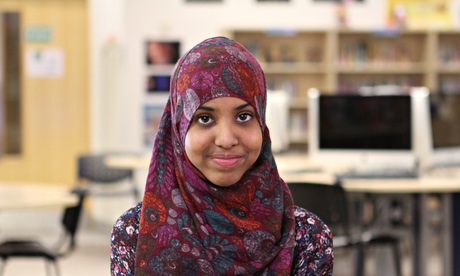
A campaign led by a 17-year-old student which calls for a new way to combat the brutal practice of female genital mutilation, has gathered more than 150,000 signatures since it was launched last Wednesday.
Fahma Mohamed, the face of the campaign, which is backed by the Guardian and a range of campaigners and FGM activists, is calling on the secretary of state for education to write to all headteachers in the country asking them to inform teachers and parents about FGM before the next summer holidays, in a bid to protect girls from being mutilated during the "cutting season". She wants a meeting with education secretary Michael Gove to put her case directly.
Fahma – one of nine daughters in a Somali family who came to Britain when she was seven years old – has been inundated with messages of support from around the globe.
"I'm honestly amazed that so many people have got behind me and have been supportive of the cause," she said. "I was expecting some kind of backlash, but it hasn't happened – I think we needed a campaign like this to show people we are not afraid to talk about it. This is a tipping point in fighting FGM, it is all in the open now – we are all united in the same aim."
In response to the campaign – one of the fastest growing petitions ever hosted on the Change.org site – Scotland's government has already taken the decision to write to every headteacher, asking them to ensure that teachers and parents are trained to recognise the risks of FGM and the warning signs. Fahma – who has also tweeted David Cameron directly about her fight – told the Guardian that she would continue to push for the same to happen across the UK. "Our goal remains the same, for the education secretary to write to all headteachers to raise awareness of FGM so this doesn't happen to more girls."
There are an estimated 66,000 victims of FGM in England and Wales, with more than 24,000 girls under 15 believed to be at risk every year. Last week the government announced a series of measures to tackle the crime – illegal in the UK since 1985 – including the introduction of mandatory recording of FGM in hospitals, money for publicity campaigns and a NSPCC helpline and global funding. But while the Department for Education said it would redraft safeguarding guidelines to include advice on FGM, it stopped short of meeting the central demand of the Guardian's campaign: for the Department for Education to contact schools directly in an attempt to tackle the issue.
In France, campaigners say they have eradicated the crime by introducing regular health checks for girls from communities where FGM is practised, training for medical professionals and teachers, and a proactive approach to bringing perpetrators to justice.
There have been some 100 prosecutions in high profile cases. Last week the director of public prosecutions Alison Saunders said 10 cases were currently being investigated in the UK, with the first prosecution expected within months.
Fahma, a trustee of Integrate Bristol which campaigns to raise awareness about the impact of FGM, has become the public face of a campaign which at its peak was gathering two signatures every second, appearing in the national and local press, radio and TV.
Brie Rogers Lowery, UK director of Change.org, said it had become one of the most high profile campaigns in the UK.
"It is remarkable that a 17-year-old has been able to energise a huge public response so fast and shows that people are clearly moved by Fahma's passion on the issue," Rogers Lowery said
Lisa Zimmermann, co-founder of Integrate Bristol, which initially met with strong opposition when it began its awareness-raising work, said Fahma had given a voice to those who could not speak out.
"The girls in Integrate Bristol have been through so much and taken so much flak, that to see their voices being heard is incredible. It has been a hard slog to get to this point, but we are thrilled and very excited."
Nimko Ali, FGM campaigner and co-founder of the charity Daughters of Eve, said: "It makes me so proud of the girls speaking out about this, and their mothers for supporting them.
"This generation scares those who want to keep doing this – they are free and fearless."

